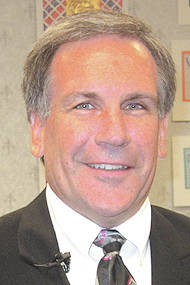
For many parents who were raising young children in the 1970s, ’80s, ’90s, and early 2000s, Fred Rogers was a comfortable daily presence in both their and their children’s lives. Since his death in 2003, the kindness and generosity displayed in his show, “Mr. Rogers’ Neighborhood,” has slowly faded from our lives.
And, that is too bad.
But, with the release and accompanying publicity of the movie, “A Beautiful Day in the Neighborhood,” he is back in the public’s consciousness, at least temporarily. The movie, which is described by its director, Marielle Heller, as “a story about kindness and family connection and trying to tap into our better self,” highlights the friendship between Mr. Rogers and a cynical reporter who was dispatched to dissect the life of a man who he (the reporter) was convinced couldn’t possibly be genuine.
He found his cynicism to be unfounded.
After spending time with Mr. Rogers, the writer discovered he was just as kind, compassionate, and nice as he seemed to be in “his neighborhood.” In other words, Mr. Rogers wasn’t just a character he was playing. He also learned that, as a holder of a master’s degree in child development, Rogers understood children as the complex beings they are and how important it is for them to feel loved, cherished and safe. He recognized that children “love to belong;” that, in fact, “they long to belong,” and that if we as adults don’t ensure that they “belong” in our family, they will fill that need elsewhere and not always in a positive manner.
Any discussion of the world of violent gangs, for example, includes the need for their members to belong to something tangible. Other gang members become their family.
Mr. Rogers valued the simple things in life that all children need; things like routine, consistency, quiet leadership, feeling loved, and having someone who will listen to them and be present in their lives.
In other words, they need compassionate role models who aren’t constantly staring at their cell phones while their kids are trying to engage with them.
In a television interview in the 1990s, Mr. Rogers stated, “I’m very concerned that our society is much more interested in information than in wonder, in noise rather than silence.” And, that was before our young people spent every waking hour glued to their cell phones while trying to gain acceptance from their peers through “likes” on their social media pages, quite possibly the most dangerous “noise” our children have ever encountered.
Today, many mental health professionals point to this incessant need to be accepted by their online “friends” as a driving force in the proliferation of mental health problems in today’s youth.
In other words, Mr. Rogers knew what he was talking about.
And, with his “we’re more interested in information than in wonder” concern, can you imagine his take on the plethora of public policies governing educating children that have reduced discussions about childhood success to a bevy of test scores?
I’m sure he is spinning in his grave.
Mr. Rogers proclaimed that “what is essential is invisible to the eye,” which is why he was far more focused on developing the inner child than on his or her cognitive learning. He understood that a maladjusted child would not achieve success regardless of how well he or she performed on a test.
Are you listening, politicians of America?
Mr. Rogers’ manner of speaking to children as he did; calmly, quietly, softly, lovingly, and openly wasn’t an accident. He understood that those tones were best suited for their successful development.
One of the more interesting facts that has been uncovered with the release of this movie is that, as a pudgy, sickly child, Fred Rogers was often bullied by his peers. In fact, his nickname was “Fat Freddy,” which obviously caused him great pain. As a testament to the man himself, he reacted to that mistreatment by becoming someone who was determined to teach others that what is inside the people we meet is far more important than the way we look, and by being kind, compassionate, and accepting to all he met.
What he didn’t opt for was to grab a gun and kill a bunch of people with the excuse that he was bullied as a child.
He was once asked how many children he thought he had influenced during his lifetime, and his response was, “I don’t care how many, even if it’s just one. We get so wrapped up in numbers in our society, and the most important thing is that we’re able to be one to one.”
Man, I miss Mr. Rogers and even though they don’t realize it, so do the children of today.
Tom Dunn is a former superintendent of the Miami County Educational Service Center.


